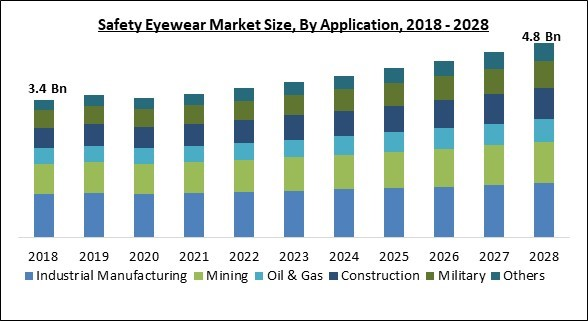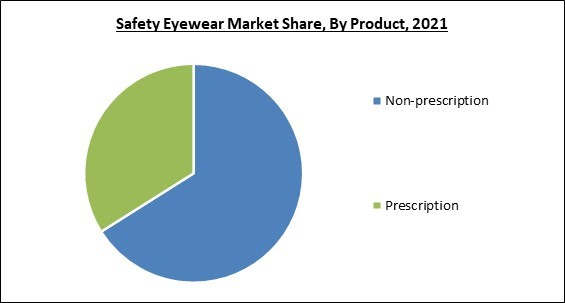Safety eyewear includes eyeglasses or goggles that offer defense against a variety of hazards that are constantly present in some hazardous work environments. Safety eyewear should not be confused with everyday glasses. While prescription eyewear can help correct eyesight, safety eyewear is, as its name suggests, primarily intended to keep the wearer safe.
Safety-related eyewear can include both prescription and non-prescription lenses and frames. An eyewear must meet an extremely high standard of impact resistance, frequently making them impenetrable, in order to be qualified for use while being worn in dangerous situations. Additionally, their form and design have to be such that they provide the worker wearing them with the most amount of protection while also being comfortable.
In order for workers to perform their duties completely and efficiently, safety eyewear must also guarantee that they have the proper vision. The use of safety eyewear is crucial for every work, where, there is a risk or danger to the eyes. Workers' eyes are clearly at risk at places of employment including factories, industries, and research labs. When dangerous chemicals, grease, oil splashes, or vapors come in contact with the eye, some of these risks are categorized as chemical hazards.
There is occasionally a chance that dust, concrete, wood, metal, or other projectiles will get in the worker’s eye. The eye requires protection from radiation as well, including lasers, infrared light, visible light, and ultraviolet light. More recently, there have been discovered dangers known as blood borne infections, which can be lethal if accidentally ingested. Therefore, safety eyewear is required in all of these locations.
COVID-19 Impact Analysis
Globally, there is a huge need for protective eyewear as a result of the COVID-19 pandemic due to increased worries about virus transmission. Touching the eyes, nose, or mouth after coming into contact with an infected surface was one of the ways the virus was spread. The need for protective eyewear throughout the nation, particularly in the medical industry, increased dramatically as a result of the virus's spread. Human eyes are shielded from solid particles, dangerous chemicals and gases, radiation, and other harmful substances with safety eyewear. It is intended to safeguard employees from harm and fatalities caused by hazardous working circumstances. As a result, the market has benefited due to the COVID-19 outbreak.Market Growth Factors
Rising Cases Of Eye Disorders
Worldwide productivity losses due to eye impairment are expected to cost US$411 billion annually, placing a significant financial burden on the entire world. Uncorrected refractive errors as well as cataracts are the main causes of vision loss and blindness. At least 2.2 billion people worldwide suffer from a near- or distance-vision impairment. Nearly half of these cases, or at least 1 billion, involved vision damage that either might have been avoided or is still unaddressed.Growing Environmental Pollution Arising Need For Protective Eyewear
The health of people is seriously impacted as air pollution increases. In addition to the regular urban pollution and smoke from forest fires, these pollutants have an impact on ground-level ozone, particulate matter, nitrogen, sulfur dioxide, dioxide, lead, and carbon monoxide. The effects of common air pollution on the eyes might range from minor to severe. According to several researches, conjunctivitis cases are rising along with overall air pollution levels. Particularly nitrogen dioxide can irritate the eyes.Marketing Restraining Factor
Low Grade Safety Eyewear Being Marketed
Making sure safety eyewear provides sufficient protection is vital from a moral, financial, and legal standpoint. Sales and demand for safety eyewear are suffering dramatically as a result of the market's abundance of inexpensive and inferior substitutes. There are many alternatives with lower prices and worse effectiveness due to the strong demand and limited supply of effective eye wears.Product Outlook
Based on product, the safety eyewear market is segmented into prescription and non-prescription. In 2021, the non-prescription segment dominated the safety eyewear market with the maximum revenue share. This is due to the fact the bulk of safety eyewear is purchased for the labor force to protect the eyes from debris and dangerous substances. Non-prescription eyewear is typically used by people who can no longer see small text.Application Outlook
On the basis of application, the safety eyewear market is fragmented into oil & gas, construction, mining, industrial manufacturing, military and others. In 2021, construction segment covered a substantial revenue share in the safety eyewear market in 2021.Working with large machinery, scaling huge buildings, and handling hazardous materials puts the lives of construction workers in danger. Wearing eye protection all the times is one of the most crucial safety precautions that construction workers can take.Regional Outlook
Region wise, the safety eyewear market is analyzed across North America, Europe, Asia Pacific and LAMEA. In 2021, the North America region led the safety eyewear market by generating the highest revenue share. The implementation of stringent rules and regulations by federal agencies such as the Bureau of Labor Statistics (BLS), Occupational Safety & Health Administration (OSHA), and other regulatory bodies regarding safety codes and norms at workplaces are expected to accelerate the region's growth.The market research report covers the analysis of key stakeholders of the market. Key companies profiled in the report include Kimberly-Clark Corporation, Honeywell International, Inc., 3M Company, Bolle Safety (Bolle Brands Group) (A&M Capital Europe), Pyramex Safety Products, LLC, Radians, Inc. (Safety Supply Corporation), MEDOP SA, Gateway Safety, Inc., MCR Safety, and Uvex Group.
Scope of the Study
By Application
- Industrial Manufacturing
- Mining
- Oil & Gas
- Construction
- Military
- Others
By Product
- Non-prescription
- Prescription
By Geography
- North America
- US
- Canada
- Mexico
- Rest of North America
- Europe
- Germany
- UK
- France
- Russia
- Spain
- Italy
- Rest of Europe
- Asia Pacific
- China
- Japan
- India
- South Korea
- Singapore
- Malaysia
- Rest of Asia Pacific
- LAMEA
- Brazil
- Argentina
- UAE
- Saudi Arabia
- South Africa
- Nigeria
- Rest of LAMEA
Key Market Players
List of Companies Profiled in the Report:
- Kimberly-Clark Corporation
- Honeywell International, Inc.
- 3M Company
- Bolle Safety (Bolle Brands Group) (A&M Capital Europe)
- Pyramex Safety Products, LLC
- Radians, Inc. (Safety Supply Corporation)
- MEDOP SA
- Gateway Safety, Inc.
- MCR Safety
- Uvex Group
Unique Offerings
- Exhaustive coverage
- The highest number of market tables and figures
- Subscription-based model available
- Guaranteed best price
- Assured post sales research support with 10% customization free
Table of Contents
Companies Mentioned
- Kimberly-Clark Corporation
- Honeywell International, Inc.
- 3M Company
- Bolle Safety (Bolle Brands Group) (A&M Capital Europe)
- Pyramex Safety Products, LLC
- Radians, Inc. (Safety Supply Corporation)
- MEDOP SA
- Gateway Safety, Inc.
- MCR Safety
- Uvex Group










